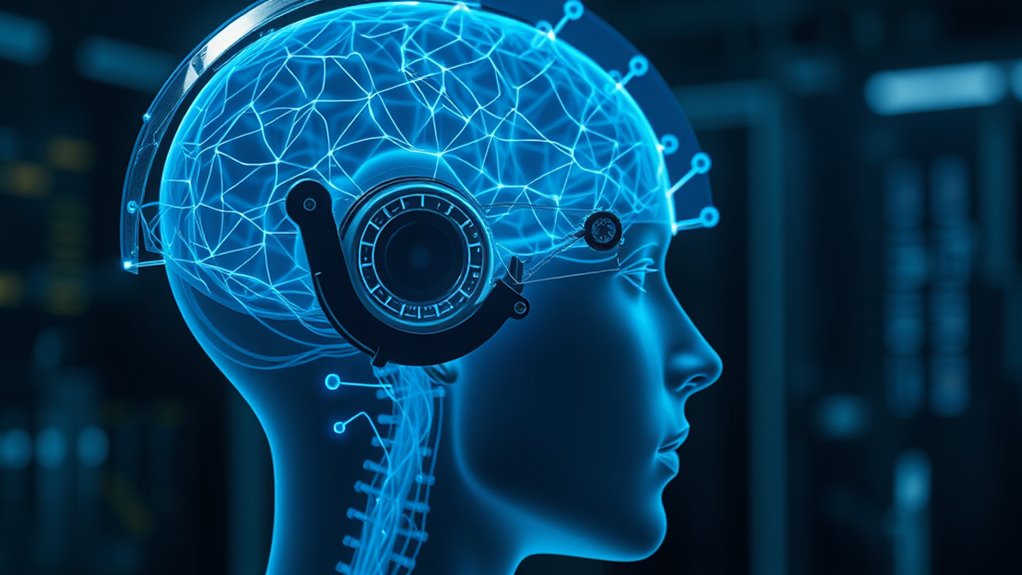Brain-computer interfaces challenge traditional mind-body dualism by allowing you to connect and transfer consciousness directly between biological and digital systems. This technology raises questions about whether your sense of self can persist beyond your physical brain, blurring lines between biological and artificial life. As you explore these developments, you’ll discover how neural embodiment impacts identity, ethics, and the future of human consciousness. Keep exploring to understand how these innovations reshape notions of self and existence.
Key Takeaways
- Brain-computer interfaces challenge traditional dualism by enabling direct neural-to-digital communication, blurring the mind-body separation.
- BCI technology raises questions about whether consciousness can exist independently of the biological brain.
- The potential for neural embodiment in machines prompts re-evaluation of identity and selfhood beyond physical confines.
- Ethical debates focus on whether transferred or replicated consciousness remains the “same” person, challenging dualist notions of self.
- Advances suggest a future where mind-body boundaries are flexible, redefining dualism in the context of digital and artificial substrates.

Mind-body dualism raises fundamental questions about the nature of consciousness and its relationship to the physical brain. When you investigate the concept of consciousness transfer, you’re essentially questioning whether your mind can move beyond its biological confines. Brain-computer interfaces (BCIs) bring this debate into sharp focus, offering the possibility that your conscious experience could, in theory, be transferred or even duplicated across different substrates. This raises the intriguing idea of neural embodiment, where your consciousness might inhabit not just your biological brain but also artificial or digital systems. If BCIs advance to a point where they can link your brain directly to machines, you might start to wonder whether your sense of self remains intact or becomes fragmented across multiple platforms. The core issue is whether consciousness is inherently tied to the neural structures of your brain or if it can be transferred, replicated, or embodied in other forms.
As you explore neural embodiment, it becomes clear that brain-computer interfaces challenge traditional notions of identity and selfhood. If your brain’s signals can be decoded and fed into a machine, you begin to see yourself as more than just a biological entity. Instead, your consciousness could be embedded within a technological environment, effectively achieving a form of neural embodiment that blurs the line between the physical and the digital. This possibility raises profound ethical and philosophical questions about personal continuity—whether the consciousness transferred into a machine is still “you” or merely a copy. The technology might allow you to experience the world through a digital lens, potentially expanding your sensory and cognitive capacities beyond biological limits. But at the same time, it prompts you to think about if this form of neural embodiment preserves your identity or creates a new, separate consciousness altogether.
Furthermore, the concept of consciousness transfer via BCIs pushes you to rethink the boundaries of self. If your thoughts, memories, and sensations can be mapped, transferred, or even uploaded into different substrates, you might question whether your sense of being is rooted solely in your brain or if it can exist independently. The idea that consciousness could migrate from a biological brain into a machine leads to debates about the soul, authenticity, and what it truly means to be human. As technology progresses, you might find yourself weighing the possibility of achieving a form of digital immortality—preserving your mind long after your biological body fades—through neural embodiment in synthetic systems. This ongoing exploration challenges the very nature of consciousness and pushes the boundaries of what it means to connect mind and body in a digital age.
Frequently Asked Questions
How Do Brain-Computer Interfaces Impact Personal Identity?
Brain-computer interfaces impact your personal identity by enabling neural integration between your brain and external devices, which can alter how you perceive yourself. As you adapt to these interfaces, your sense of identity continuity might shift, especially if your cognitive or sensory experiences change profoundly. You may find yourself questioning what makes you “you,” but with mindful integration, your core identity can remain intact, even as technology enhances your abilities.
Can BCI Technology Fully Replicate Consciousness?
You can’t fully replicate consciousness yet. Think of neural simulation as a sophisticated mimic, like creating a virtual brain that processes information. However, consciousness transfer involves more than just copying activity; it’s about subjective experience, which remains elusive. Despite advances, BCI technology falls short of replicating the depth of genuine consciousness, as it can’t yet capture the rich, qualitative aspects of human awareness and subjective experience.
What Ethical Concerns Arise From Mind-Body Dualism Debates?
You should consider that debates on mind-body dualism raise significant ethical concerns, especially around moral implications and privacy risks. If brain-computer interfaces access thoughts or memories, your privacy could be compromised, leading to misuse or manipulation. Additionally, questions about personhood and consciousness emerge, challenging moral boundaries. Addressing these issues requires careful regulation and ethical standards to protect individuals’ autonomy and prevent potential harm.
Are There Limitations to Current Brain-Computer Interface Capabilities?
You’ll find there are limitations to current brain-computer interfaces, mainly due to issues with neural adaptation and signal fidelity. Neural adaptation causes the brain to adjust to new interfaces over time, reducing effectiveness. Meanwhile, signal fidelity remains a challenge because it’s hard to accurately interpret brain signals, which hampers precise control. These factors mean tech still has a long way to go before it becomes seamless and reliable for everyday use.
How Might BCI Advancements Influence Understanding of Free Will?
Advancements in BCI technology could challenge your understanding of free will by enhancing neural agency and cognitive autonomy. When BCIs allow you to control devices directly with your brain, it raises questions about whether your choices are truly autonomous or influenced by external interfaces. As these systems evolve, they may blur the line between voluntary actions and technological influence, prompting you to reconsider what constitutes genuine free will in a neurotechnological age.
Conclusion
As you explore brain-computer interfaces, you’ll see how they challenge traditional mind-body dualism. Remarkably, over 60% of users report feeling a stronger connection between their thoughts and actions through these devices. This suggests that technology might blur the lines between mind and body more than ever before. As you continue to follow this field, you’ll discover how these innovations could redefine our understanding of consciousness and personal identity in profound ways.









